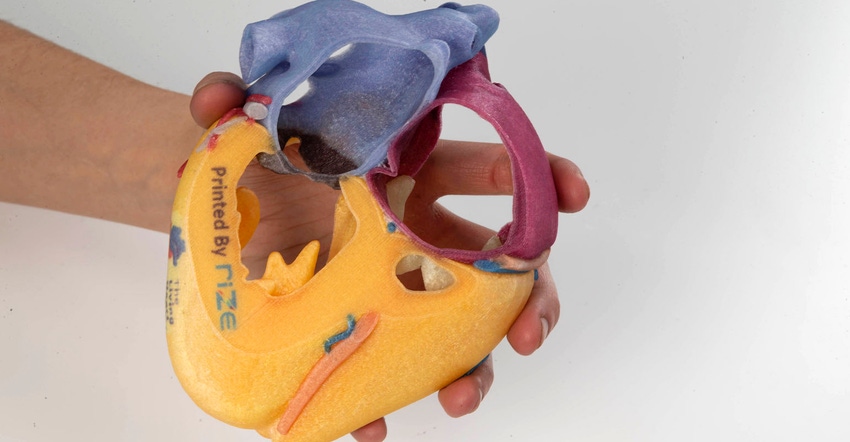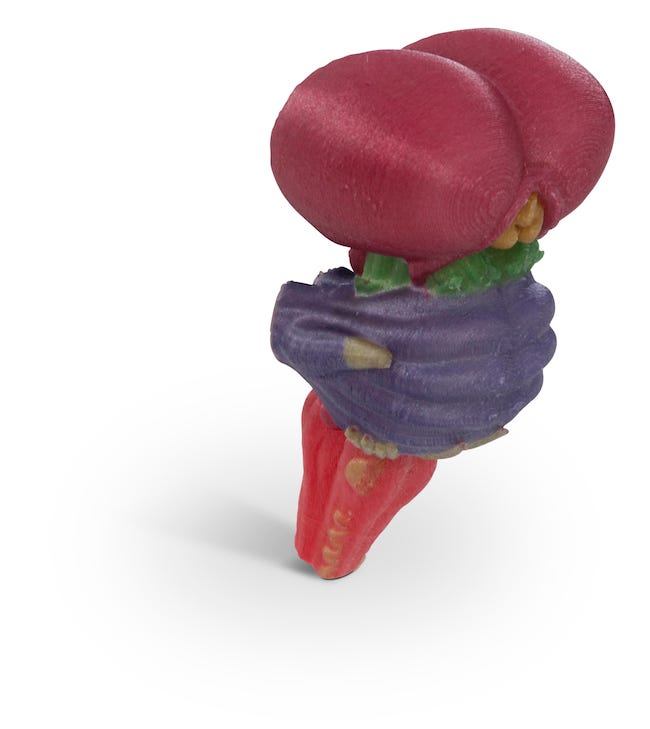Rizium Glass Fiber is the only composite 3D-printing material suitable for full-color parts with the stability to support complex geometries, according to additive manufacturing company Rize. The material and 3D-printing platform have obtained UL Greenguard certification for low emissions.
August 13, 2020

Additive manufacturing company Rize introduced today Rizium Glass Fiber (GF), which it describes as the only composite 3D-printing material suitable for full-color parts with the stability to support complex geometries that, otherwise, might warp.
Rizium GF is based on Rize’s cyclic-olefin-based matrix that does not release emissions at extrusion temperatures and has extremely low moisture absorption and high chemical resistance. Tested for durability and strength, Rizium GF leverages the company’s Augmented Polymer Deposition (APD) digital material technology, which enables the polymer to combine with functional inks to create new material properties.
Rizium GF is stable over large build volumes and is suitable for a range of applications in the education, industrial, and life science spaces, especially for functional full-color prototyping, said the company. “Being able to transform 3D rendered models into accurate full color parts is something our customers love,” said Ronnie Sherrer, Application Engineer at Azoth, an Ann Arbor–based provider of technology and additive manufacturing to large manufacturers.
“For the first time ever, Rizium GF brings the strength of composites to 3D printing of medical models for pre-surgical planning, patient and family education, and full-color prototyping and design verification of medical devices,” Rize CEO Andy Kalambi told PlasticsToday.
|
Rizium GF brings the strength of composites to 3D printing of medical models, such as the brain stem pictured here. Image courtesy Rize. |
The material’s durability allows users to create products that stand out, added Kalambi. “They can create full-color prototypes of medical devices, with the inks incorporated into the polymer itself . . . prototypes that are realistic and support even complex geometries without warping or cracking. Since Rizium GF is chemical- and moisture-resistant, it can be sanitized with isopropyl alcohol, and moisture does not get absorbed and create traps for virus, bacteria, or other particles,” said Kalambi.
Rizium GF has obtained UL Greenguard certification on the XRize full-color composite 3D-printing platform, confirming it is safe for use in offices, schools, hospitals, and other enclosed spaces. Because it generates low emissions, “it’s suitable for printing in point-of-care locations without the ventilation typically required for safe 3D printing use,” Kalambi told PlasticsToday. By contrast, many desktop 3D printers release into the air volatile organic compounds and ultra-fine particles, known health hazards, according to Rize.
Rizium GF is Rize’s fourth product to obtain UL Greenguard certification, including the XRize full-color composite 3D printer, Rizium ST 3D-printing filament material, Rizium inks, and Rize One monochrome printer. Based on the ANSI/CAN/UL 2904 Standard Method for Testing and Assessing Particle and Chemical Emissions from 3D Printers, Greenguard certification affirms that materials and products emit low levels of chemicals during use and contribute to safer, healthier indoor air.
“Until now, full-color 3D-printing applications could only deliver weak approximations of the original, and users often avoided large parts or complex geometries because they could warp or crack,” said Kalambi. “We’re delighted to help drive a renaissance in industrial manufacturing with better 3D-printing materials and technology. With Rizium GF’s high dimensional stability and durability, and UL Greenguard certification for low chemical emissions, users have the flexibility to expand the applications suitable for 3D printing.”
About the Author(s)
You May Also Like





